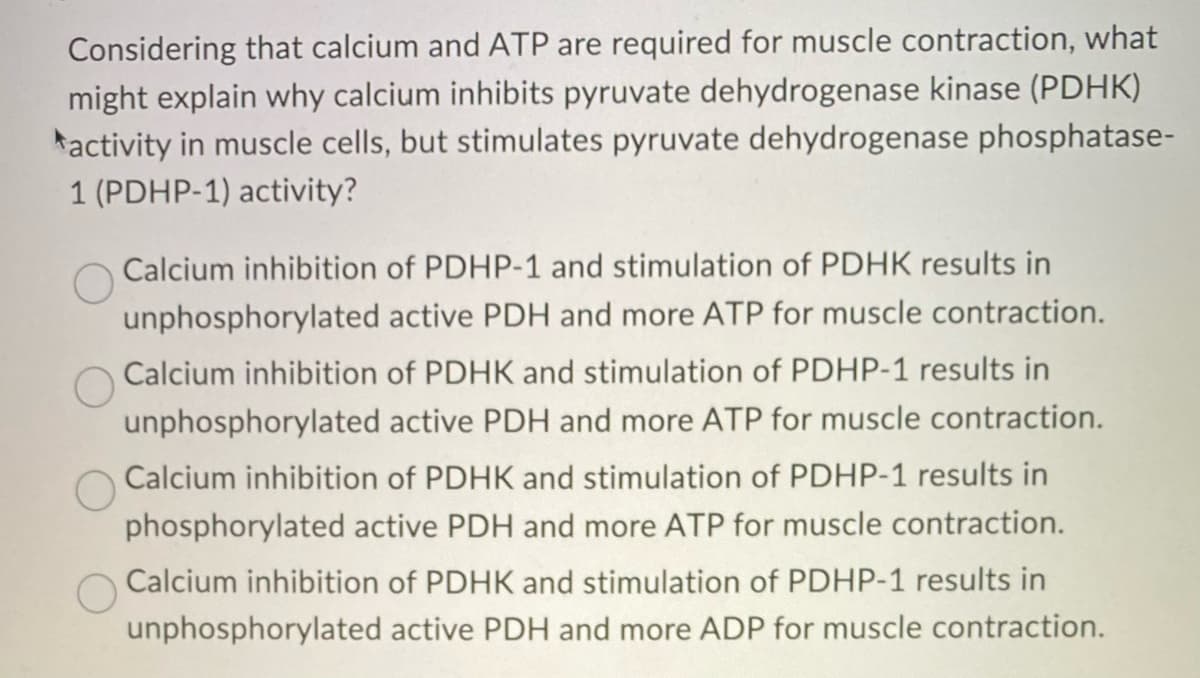Considering that calcium and ATP are required for muscle contraction, what might explain why calcium inhibits pyruvate dehydrogenase kinase (PDHK) activity in muscle cells, but stimulates pyruvate dehydrogenase phosphatase- 1 (PDHP-1) activity? Calcium inhibition of PDHP-1 and stimulation of PDHK results in unphosphorylated active PDH and more ATP for muscle contraction. Calcium inhibition of PDHK and stimulation of PDHP-1 results in unphosphorylated active PDH and more ATP for muscle contraction. Calcium inhibition of PDHK and stimulation of PDHP-1 results in phosphorylated active PDH and more ATP for muscle contraction. Calcium inhibition of PDHK and stimulation of PDHP-1 results in unphosphorylated active PDH and more ADP for muscle contraction.
Considering that calcium and ATP are required for muscle contraction, what might explain why calcium inhibits pyruvate dehydrogenase kinase (PDHK) activity in muscle cells, but stimulates pyruvate dehydrogenase phosphatase- 1 (PDHP-1) activity? Calcium inhibition of PDHP-1 and stimulation of PDHK results in unphosphorylated active PDH and more ATP for muscle contraction. Calcium inhibition of PDHK and stimulation of PDHP-1 results in unphosphorylated active PDH and more ATP for muscle contraction. Calcium inhibition of PDHK and stimulation of PDHP-1 results in phosphorylated active PDH and more ATP for muscle contraction. Calcium inhibition of PDHK and stimulation of PDHP-1 results in unphosphorylated active PDH and more ADP for muscle contraction.
Biochemistry
9th Edition
ISBN:9781319114671
Author:Lubert Stryer, Jeremy M. Berg, John L. Tymoczko, Gregory J. Gatto Jr.
Publisher:Lubert Stryer, Jeremy M. Berg, John L. Tymoczko, Gregory J. Gatto Jr.
Chapter1: Biochemistry: An Evolving Science
Section: Chapter Questions
Problem 1P
Related questions
Question
8

Transcribed Image Text:Considering that calcium and ATP are required for muscle contraction, what
might explain why calcium inhibits pyruvate dehydrogenase kinase (PDHK)
activity in muscle cells, but stimulates pyruvate dehydrogenase phosphatase-
1 (PDHP-1) activity?
unphosphorylated
Calcium inhibition of PDHP-1 and stimulation of PDHK results in
active PDH and more ATP for muscle contraction.
Calcium inhibition of PDHK and stimulation of PDHP-1 results in
unphosphorylated active PDH and more ATP for muscle contraction.
Calcium inhibition of PDHK and stimulation of PDHP-1 results in
phosphorylated active PDH and more ATP for muscle contraction.
Calcium inhibition of PDHK and stimulation of PDHP-1 results in
unphosphorylated active PDH and more ADP for muscle contraction.
Expert Solution
This question has been solved!
Explore an expertly crafted, step-by-step solution for a thorough understanding of key concepts.
This is a popular solution!
Trending now
This is a popular solution!
Step by step
Solved in 2 steps

Recommended textbooks for you

Biochemistry
Biochemistry
ISBN:
9781319114671
Author:
Lubert Stryer, Jeremy M. Berg, John L. Tymoczko, Gregory J. Gatto Jr.
Publisher:
W. H. Freeman

Lehninger Principles of Biochemistry
Biochemistry
ISBN:
9781464126116
Author:
David L. Nelson, Michael M. Cox
Publisher:
W. H. Freeman

Fundamentals of Biochemistry: Life at the Molecul…
Biochemistry
ISBN:
9781118918401
Author:
Donald Voet, Judith G. Voet, Charlotte W. Pratt
Publisher:
WILEY

Biochemistry
Biochemistry
ISBN:
9781319114671
Author:
Lubert Stryer, Jeremy M. Berg, John L. Tymoczko, Gregory J. Gatto Jr.
Publisher:
W. H. Freeman

Lehninger Principles of Biochemistry
Biochemistry
ISBN:
9781464126116
Author:
David L. Nelson, Michael M. Cox
Publisher:
W. H. Freeman

Fundamentals of Biochemistry: Life at the Molecul…
Biochemistry
ISBN:
9781118918401
Author:
Donald Voet, Judith G. Voet, Charlotte W. Pratt
Publisher:
WILEY

Biochemistry
Biochemistry
ISBN:
9781305961135
Author:
Mary K. Campbell, Shawn O. Farrell, Owen M. McDougal
Publisher:
Cengage Learning

Biochemistry
Biochemistry
ISBN:
9781305577206
Author:
Reginald H. Garrett, Charles M. Grisham
Publisher:
Cengage Learning

Fundamentals of General, Organic, and Biological …
Biochemistry
ISBN:
9780134015187
Author:
John E. McMurry, David S. Ballantine, Carl A. Hoeger, Virginia E. Peterson
Publisher:
PEARSON